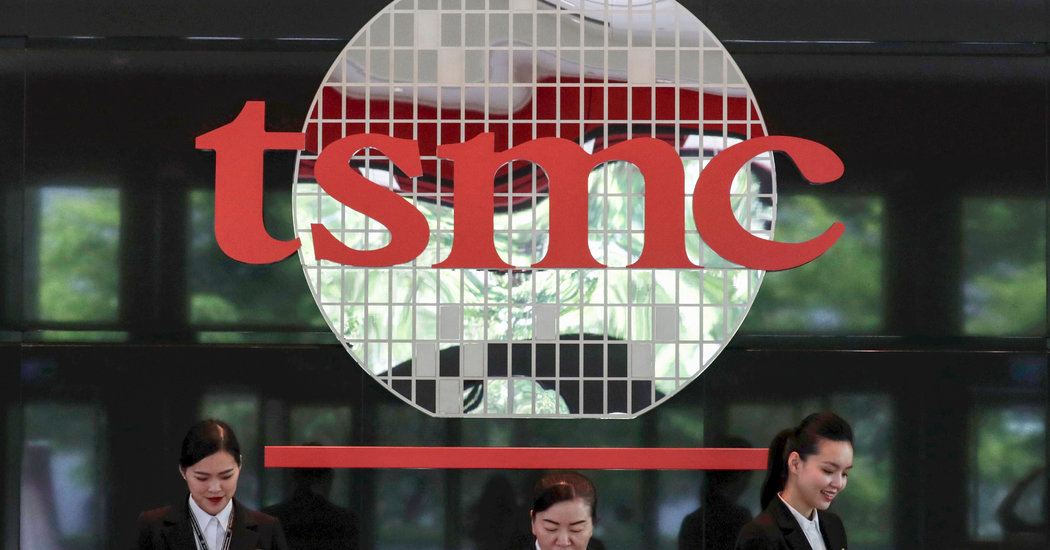SAN FRANCISCO — Pentagon officials have been keeping non-public discussions with tech industry executives to wrestle with a important query: how to make sure long term supplies of the advanced laptop or computer chips wanted to keep America’s armed service edge.
The talks, some of which predate the Trump administration, not long ago took on an increased urgency, according to persons who were involved or briefed on the discussions. Pentagon officials inspired chip executives to consider new creation strains for semiconductors in the United States, mentioned the persons, who declined to be recognized mainly because the talks had been confidential.
The conversations are becoming driven by the Pentagon’s improved dependence on chips designed overseas, specifically in Taiwan, as perfectly as recent tensions with China, these people mentioned.
One chip maker, the Taiwan Semiconductor Producing Firm, better regarded as TSMC, performs a specially critical job producing commercial chips that also have purposes for plane, satellites, drones and wi-fi communications. And mainly because of unrest around the previous number of months in the semiautonomous Chinese territory of Hong Kong, some Pentagon officers and chip executives have puzzled about predicaments that could force suppliers in Taiwan to restrict or cut off silicon shipments, the people today said.
Mark Liu, the chairman of TSMC, said he experienced lately mentioned solutions for a new manufacturing unit in the United States with the Commerce Section. The stumbling block was revenue big subsidies would be necessary, he reported, as it is additional high priced to work in America than Taiwan.
“It is all up to when we can close the value hole,” he mentioned in an job interview.
The discussions are a indicator of how federal companies are grappling with a deep-rooted technological innovation conundrum. The United States has lengthy fielded the most innovative weaponry by exploiting digital elements after completely generated in the country. Chips assist tanks, aircraft, rockets and ships navigate, communicate with 1 a different and interact enemy targets.
But domestic output traces of numerous chips have extensive considering that moved overseas, elevating questions about supply interruptions in the celebration of political or armed service crises overseas. Individuals fears have been exacerbated by the growing significance of particular elements — this sort of as programmable chips that determine prominently in the F-35 fighter jet, which are made by the Silicon Valley organization Xilinx and mostly fabricated in Taiwan.
Some chips, this sort of as the wireless baseband processors required for new 5G communications talents that Pentagon officers covet, have to have superior producing technological innovation that has grow to be a important marketing point of TSMC.
“We in the Defense Division cannot manage to be shut out of all of these capabilities,” stated Lisa Porter, deputy beneath secretary for research and engineering, in remarks at an function in July that were later on commonly circulated between chip makers.
Dr. Porter, at a technologies celebration in Los Angeles on Wednesday, said protected source chains for each critical components and computer software were a “macro” issue that the Pentagon and the tech market had to collaborate on. She declined to focus on unique endeavours to bolster American chip manufacturing. A Protection Office spokesman also declined to remark.
In one more indication of action, Skywater Technological know-how, a Minnesota chip production provider, stated this 7 days that the Protection Division would spend up to $170 million to raise its manufacturing and enrich technologies, this sort of as the potential to create chips that can face up to radiation in house.
The Skywater financial investment illustrates how the Pentagon is also wrestling with how to enhance getting old technologies at domestic companies that make small volumes of categorised chips tailored for the armed service. These types of “trusted” factories, as they are called, function beneath Pentagon policies aimed at avoiding sabotage or data theft.
Dr. Porter and other Pentagon officials have pushed for new complex safeguards other than guards and worker track record checks to keep delicate chip models secure, a tactic that would help the Defense Office use extra superior professional factories. She termed the idea a “zero-trust” philosophy.
TSMC, which dominates the develop-to-get services termed foundries, lately took the guide from Intel in shrinking chip circuitry to give chips increased ability. Its creation edge is one motive the firm has continued to win company from major American chip designers these as Apple, Qualcomm and Nvidia, whose chips have come to be progressively critical for defense as well as civilian programs.
The United States stays the major provider and innovator in most chip technologies, including the processors that Intel sells for just about all own computer systems and server methods. But the Pentagon’s research arm — DARPA, for the Defense Highly developed Exploration Jobs Agency — has been hoping since 2017 to spur chip improvements underneath a $1.5 billion Electronics Resurgence Initiative.
Its objectives involve obtaining alternate options to silicon for producing and packaging smaller “chiplets” together instead of producing huge monolithic chips.
“We have vulnerabilities we genuinely need to address, but we are even now the dominant producer of electronics in the world,” explained Mark Rosker, the director of DARPA’s microsystems technology workplace. He stated thoughts about the American semiconductor industry known as for “a sleek and deemed form of worry.”
A lot of the current urgency stems from China’s expanding stature as a chip innovator. Designers there have produced chips for sensitive applications these as supercomputers. Numerous of the designers — together with Huawei, a key concentrate on of the Trump administration in the trade war — also rely on TSMC for producing.
Yet another impetus for action stems from a latest pullback by GlobalFoundries. The chip maker, owned by buyers in Abu Dhabi, has spent about $12 billion on a complex manufacturing facility in Malta, N.Y. But it declared very last calendar year that it would end seeking to build smaller circuitry than that on its existing production procedures.
GlobalFoundries now makes categorized chips under the trusted foundry rules in two previous IBM factories it took over in 2015. Enterprise executives think the engineering in its Malta facility remains sophisticated sufficient to also serve military services needs for years, and it is negotiating with officers to manage long term labeled operate as a result of proposed modifications to the government’s dependable foundry polices. It not long ago submitted a lawsuit accusing TSMC of patent infringement, an action that it mentioned was aimed partly at shielding the American production base.
The corporation, which announced ideas for a $10 billion manufacturing facility in China in 2017, is also rethinking that undertaking as the promised need from prospects there now seems unsure, stated Thomas Caufield, the main executive of GlobalFoundries.
Influencing the chip sector made use of to be a lot easier when the Protection Section accounted for a significant part of chip revenue. Now defense applications are dwarfed by civilian uses, these kinds of as smartphones and personalized computer systems. Far more of the Pentagon’s price range now goes to chips like memory and processors whose models are formed by professional demands.
At a latest panel of semiconductor sector veterans in Silicon Valley, the problem about an overreliance on TSMC was apparent.
“What will come about when China helps make its travel toward Taiwan? What will happen to TSMC?” asked Diane Bryant, a former Intel government who is now a engineering trader. “What is our way out of this pickle?”
The panelists advised that the federal governing administration should subsidize additional domestic chip creation. But highly developed business factories can expense as much as $15 billion, in addition the additional recurring expenditures to operate, team and supply this kind of amenities.
“It’s a huge problem,” mentioned Handel Jones, a semiconductor marketing consultant with Worldwide Company Procedures. “Our assessment was you have to expend large funds.”
Dr. Liu of TSMC dismissed fears about Taiwan’s ongoing autonomy. He stated he was weighing the pros and disadvantages of a new American manufacturing facility, though it was way too early for a decision. If the economic difficulties are prevail over, he reported, any new facility is probable to be more compact than TSMC’s massive plants in Taiwan and constructed in the vicinity of a manufacturing facility it operates in Camas, Clean.
“We want to do what can make the most effective perception for our consumers to help them to be aggressive, and also deal with countrywide-security issues,” Dr. Liu reported.







Leave a Reply